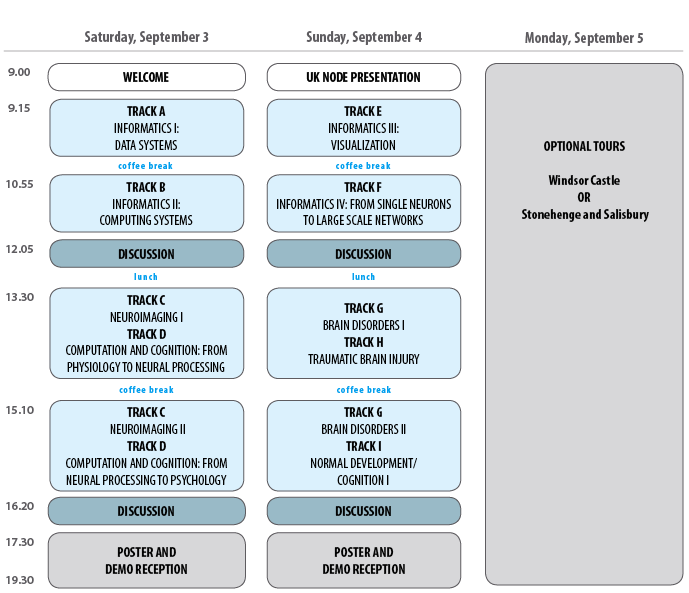Program
Day 1: Saturday, September 3
09:00 OPENING STATEMENT
Alan Evans, McGill University, Canada, Program committee chair
09:15 TRACK A - INFORMATICS I: DATA SYSTEMS
09:15 KEYNOTE Moving grounds: The evolution of neuroinformatics, statistical, and sociological aspects and their interactions in brain imaging research
Jean-Baptiste Poline, University of California Berkeley, USA
09:45 Neuroscience gateway – cyberinfrastructure providing supercomputing resources for large scale computational neuroscience research
Amitava Majumdar, University of California San Diego
10:05 Linking computational models to experimental data with the Brain Operation DataBase (BODB)
James J Bonaiuto, University College London
10:25 COFFEE
10:55 TRACK B - INFORMATICS II: COMPUTING SYSTEMS
10:55 KEYNOTE Web platforms for high-throughput neuroimaging analyses: state of the art and future directions
Tristan Glatard, McGill University, Canada
11:25 Easy-to-use GPU acceleration of neural network simulations with GeNN
James P Turner, University of Sussex, UK
11:45 Automatic analysis (aa): efficient and transparent multimodal neuroimaging workflows
Tibor Auer, University of Cambridge, UK
12:05 ROUNDTABLE DISCUSSION
12:35 LUNCH
Parallel sessions in the afternoon
13:30 TRACK C - NEUROIMAGING I
13:30 KEYNOTE 3D-Polarized light imaging – The structural connectome goes microscopic
Markus Axer, Forschungszentrum Jülich, Germany
14:00 A symmetry-based method to infer structural brain networks from probabilistic tractography data
Constantine Dovrolis, Georgia Tech, USA
14:20 Whole brain fMRI activity at a high temporal resolution: A novel analytic framework
Niels Janssen, Universidad de La Laguna, Spain
13:30 TRACK D - COMPUTATION AND COGNITION: FROM PHYSIOLOGY TO NEURAL PROCESSING
13:30 KEYNOTE Emergence of subnetworks in plastic recurrent networks
Claudia Clopath, Imperial College, UK
14:00 Common neural coding across domains of decision making identified by meta-analysis
Krishna Miyapuram, Indian Institute of Technology, India
14:20 Statistical uncertainty and sensitivity analysis of intracellular signaling models - through approximate Bayesian computation and variance based global sensitivity analysis
Olivia Eriksson, Stockholm University, Sweden
14:40 COFFEE
15:10 TRACK C - NEUROIMAGING II
15:10 KEYNOTE Deep neural networks: a new framework for modelling brain information processing
Nikolaus Kriegeskorte, University of Cambridge, UK
15:40 Over a unified connectivity estimator for intra and inter-frequency couplings through symbolic transfer entropy: A MEG resting-state analysis
Stavros I. Dimitriadis, Cardiff University School of Medicine, UK
16:00 An information theoretic framework for neuroimaging data analysis: stimulus modulations, representational interactions and causal communication of specific information content
Robin A. A. Ince, University of Glasgow, UK
15:10 TRACK D - COMPUTATION AND COGNITION: FROM NEURAL PROCESSING TO PSYCHOLOGY
15:10 KEYNOTE Neurocomputational Modeling in Psychiatry
Peter Dayan, University College London, UK
15:40 Simultaneous modeling of brain and behavior using dynamic field theory: Probing the neural dynamics of response selection
Sobana Wijeakumar, University of East Anglia, UK
16:00 Simulating word acquisition and semantic grounding in a neuroanatomically realistic, Hebbian-learning, spiking neural network model of the cortex
Max Garagnani, Freie Universität Berlin, Germany
16:20 ROUNDTABLE DISCUSSION
17:30 POSTER SESSION AND DRINK RECEPTION (COMPLIMENTARY, REFRESHMENTS SERVED)
Welcome from Linda Lanyon, INCF Executive Director
Day 2: Sunday, September 4
09:00 UK NODE PRESENTATION
Leslie Smith, University of Stirling, UK
09:15 TRACK E - INFORMATICS III: VISUALIZATION
09:15 KEYNOTE Massive Scale Neuroinformatics
Hanchuan Peng, Allen Institute for Brain Science, USA
09:45 Measuring complex brain networks structure
Ester Bonmati, University of Girona, Spain
10:05 Virtual reality visualisation of a biologically realistic anatomical and functional model of the tadpole spinal cord
Marius Varga, University of Plymouth, UK
10:25 COFFEE
10:55 TRACK F - INFORMATICS IV: FROM SINGLE NEURONS TO LARGE-SCALE NETWORKS: CONNECTING MICRO MACRO SCALES
10:55 KEYNOTE Towards a modeling framework for the efficient creation, simulation and analysis of brain functions
Jeffrey Krichmar, University of California Irvine,USA
11:25 Reconstructing and simulating neocortical microcircuitry
Srikanth Ramaswamy, Ecole Polytechnique Federale de Lausanne, Switzerland
11:45 Relating extrinsic connections to the intrinsic architecture of the cerebral cortex
Claus Hilgetag, University Medical Center Hamburg-Eppendorf, Germany
12:05 ROUNDTABLE DISCUSSION
12:35Trellis spotlight presentation
Lou Woodley, AAAS, USA
12:45 LUNCH
Parallel sessions in the afternoon
13:30 TRACK G - BRAIN DISORDERS I
13:30 KEYNOTE The evolving role for imaging in optimizing treatment for depression
Helen Mayberg, Emory University, USA
14:00 Mechanisms underlying different onset patterns of focal seizures
Yujiang Wang, Newcastle University, UK
14:20 Detection and cortical localization of ictal signatures using electroencephalogram signals
Piyush Swami, Indian Institute of Technology Delhi, India
13:30 TRACK H - TRAUMATIC BRAIN INJURY
13:30 KEYNOTE Acquiring and analysing data in TBI: Challenges and opportunities
David Menon, University of Cambridge, UK
14:00 Computational challenges for the analysis of intracranial pressure and heart rate data in traumatic brain injuries patients
Pietro Lio, University of Cambridge, UK
14:20 Legal, ethical and technical challenges of international clinical data sharing: The Center-TBI experience
Jeannette Söderberg, INCF, Sweden
14:40 COFFEE
15:10 TRACK G - BRAIN DISORDERS II
15:10 KEYNOTE Integrative hubs in the connectome
Martijn van den Heuvel, University Medical Center Utrecht, the Netherlands
15:40 Contributions from white and grey matter on structural connectomes of temporal lobe epilepsy patients
Peter Neal Taylor, Newcastle University, UK
16:00 Determining epilepsy surgery targets through connectome-based computer simulations
Marcus Kaiser, Newcastle University, UK
15:10 TRACK I - NORMAL DEVELOPMENT / COGNITION
15:10 KEYNOTE Typical and atypical development of large-scale brain networks
Vinod Menon, Stanford School of Medicine, USA
15:40 Detailed computational modeling of the developmental self- organization of neuronal structure and function
Roman Bauer, Newcastle University, UK
16:00 KEYNOTE The functional and neural architecture of object concepts
Yanchao Bi, Beijing Normal University, China
16:20 ROUNDTABLE DISCUSSION
17:30 POSTER SESSION AND DRINK RECEPTION (COMPLIMENTARY, REFRESHMENTS SERVED)
Closing remarks Keiji Tanaka, INCF Governing Board Chair




